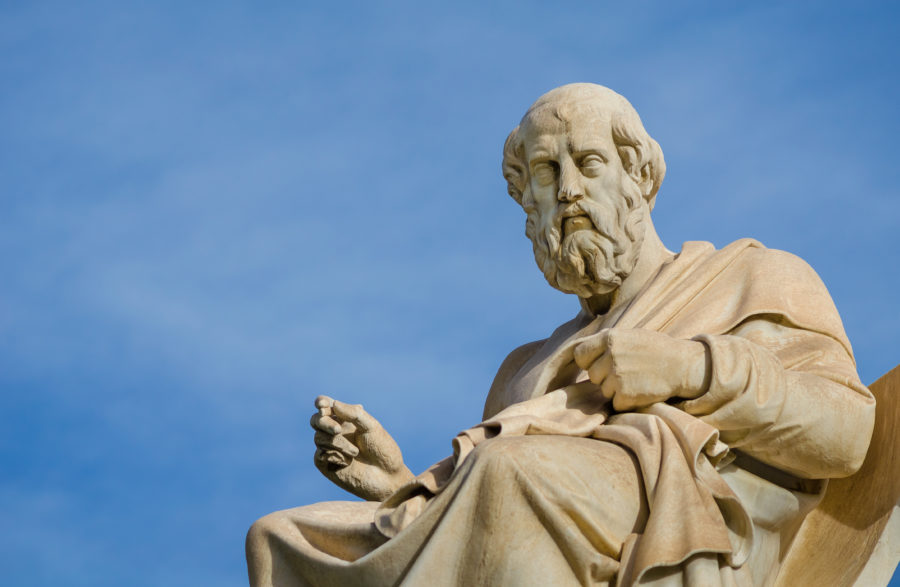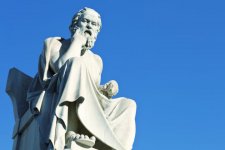Menu
Install the app
How to install the app on iOS
Follow along with the video below to see how to install our site as a web app on your home screen.
Note: This feature may not be available in some browsers.
You are using an out of date browser. It may not display this or other websites correctly.
You should upgrade or use an alternative browser.
You should upgrade or use an alternative browser.
Greek History Community
Who are your favorite Greek philosophers?
- Thread starter cf_fraiser
- Start date
1 - 7 of 7 Posts
Vangelis
Active member
I remember doing this at school and thinking what is this rubbish they are teaching us? Now, I find myself quoting it all the time!Aristotle for sure. I love the allegory of the cave
francescool
Active member
Same!! The more we learn the more were able to learnI remember doing this at school and thinking what is this rubbish they are teaching us? Now, I find myself quoting it all the time!
k_tsoukalas
Administrator
I think it is a good idea to start with an overview. There are many philosophers, and all came about at different time periods and have different, conflicting beliefs. Maybe start here?

 www.greekboston.com
www.greekboston.com

Top Ancient Greek Philosophers
Here's a look at the top ten ancient Greek philosophers.
1 - 7 of 7 Posts
JOIN THE DISCUSSION AND READ OTHER GREEK INFO:
What did the Ancient Greeks eat?
- mj_toronto8
- Greek History Forum
- Replies: 1
I am fascinated by the Ancient Greeks. I have a feeling that some of our modern Greek recipes are similar to the ancient ones. Like spoon sweets. It think that seems like something that was developed a long time ago as a way to preserve the fruit harvest.
So, I have been researching this. What did the Ancient Greeks eat? I wanted to share this video because I thought it was interesting.
So, I have been researching this. What did the Ancient Greeks eat? I wanted to share this video because I thought it was interesting.
Interesting Greek History Topics I Like
- redsoxdw_
- Greek History Forum
- Replies: 2
The Persian Wars: The wars fought between Greece and the Persian empire in the 5th century BC were some of the most consequential conflicts of ancient times. Learn about the key events, such as the Battle of Marathon and the Battle of Thermopylae, and the strategies that allowed the Greeks to repel the Persian invaders.
The Rise of Athens: Arguably the most influential city-state in ancient Greece, Athens was the birthplace of democracy, philosophy, and the arts. Follow the rise of Athens from a humble village to a powerhouse of trade and culture.
The Peloponnesian War: The decades-long conflict between Athens and Sparta was a turning point in Greek history, leading to the decline of Athens and the rise of Macedon under Philip II and his son Alexander.
The Life of Alexander the Great: The young conqueror who led his armies across the known world, Alexander the Great is one of the most famous and admired figures of ancient history. Learn about his upbringing, his conquests, and his legacy.
The Olympic Games: A tradition that continues to this day, the ancient Olympics were a celebration of sports, culture, and political power. Explore the origins of the games and the events that took place.
The Rise of Athens: Arguably the most influential city-state in ancient Greece, Athens was the birthplace of democracy, philosophy, and the arts. Follow the rise of Athens from a humble village to a powerhouse of trade and culture.
The Peloponnesian War: The decades-long conflict between Athens and Sparta was a turning point in Greek history, leading to the decline of Athens and the rise of Macedon under Philip II and his son Alexander.
The Life of Alexander the Great: The young conqueror who led his armies across the known world, Alexander the Great is one of the most famous and admired figures of ancient history. Learn about his upbringing, his conquests, and his legacy.
The Olympic Games: A tradition that continues to this day, the ancient Olympics were a celebration of sports, culture, and political power. Explore the origins of the games and the events that took place.
Question about Greece during WWI
- ssherie_
- Greek History Forum
- Replies: 0
I am trying to learn more about Greek history. This is a family project! What I am learning about now is Greece's involvement in WWI. From what I've gathered, Greece had a rather complex and interesting stance during World War I, but I'm looking for more in-depth information.
Could anyone here provide insights or point me towards resources that detail:
Could anyone here provide insights or point me towards resources that detail:
- Greece's political climate leading up to its involvement in WWI.
- The significance of the National Schism and how it affected Greece's participation.
- Key battles or military campaigns that Greek forces were involved in.
Learning about the Spartan way of life
- dimi_pat
- Greek History Forum
- Replies: 1
I find the Spartans fascinating. They seemed to have a different way of life!
The Spartans, known for their military might, also led a lifestyle that was remarkably disciplined and focused on simplicity.
The core of Spartan society was its military-oriented ethos. From a young age, Spartan boys were trained to be soldiers in the agoge, a rigorous education system that emphasized physical training, endurance, and survival skills. This preparation was not just about warfare but about creating individuals who were resilient, self-sufficient, and disciplined.
But Spartan discipline extended beyond the military sphere. Spartans lived a life of austerity and frugality that is quite alien to our modern way of living. Meals were simple, homes were unadorned, and luxuries were frowned upon. This was not out of a lack of resources but a deliberate choice to avoid softness and dependency on material comforts.
Interestingly, this Spartan simplicity also fostered a sense of equality among citizens. By eschewing luxury, Spartans aimed to reduce divisions within their society. Wealth and status were downplayed, while military prowess and moral integrity were valued above all.
What do you guys think about this or what can you add to my thinking?
The Spartans, known for their military might, also led a lifestyle that was remarkably disciplined and focused on simplicity.
The core of Spartan society was its military-oriented ethos. From a young age, Spartan boys were trained to be soldiers in the agoge, a rigorous education system that emphasized physical training, endurance, and survival skills. This preparation was not just about warfare but about creating individuals who were resilient, self-sufficient, and disciplined.
But Spartan discipline extended beyond the military sphere. Spartans lived a life of austerity and frugality that is quite alien to our modern way of living. Meals were simple, homes were unadorned, and luxuries were frowned upon. This was not out of a lack of resources but a deliberate choice to avoid softness and dependency on material comforts.
Interestingly, this Spartan simplicity also fostered a sense of equality among citizens. By eschewing luxury, Spartans aimed to reduce divisions within their society. Wealth and status were downplayed, while military prowess and moral integrity were valued above all.
What do you guys think about this or what can you add to my thinking?
History of the tradition of decorating boats for Christmas
- voula_slat
- Greek History Forum
- Replies: 1
One of the most interesting Greek Christmas traditions to me is the one where people decorate boats. So, I started to research the history. Here's a bit of what I discovered:
The roots of the tradition of decorating boats in Greece for Christmas can be traced back to the country's longstanding ties with the sea. In Ancient Greece, people would often looked to the sea for both sustenance and inspiration, and it was not uncommon for ships to be adorned with religious symbols and decorations.
It also has ties to early Christianity in Greece. According to Greek Orthodox beliefs, Saint Nicolas (aka Santa Claus) was a sailor, and he is the patron saint of sailors. Decorating boats is often seen as a way to honor him.
Over time, this practice became associated with the Christmas season, and the boats began to be decorated specifically for the holiday.
People also make paper boats to decorate. Some call these the "yule boat" or karavaki. One of the most famous examples of this practice is the Yule boat, or karavaki.
The earliest known evidence of decorating boats for Christmas in Greece dates back to the 19th century. During this time, sailors would deck out their boats with lights and tiny boats. These tiny boats were often placed inside the larger boat, symbolizing protection from harm while at sea.
Does anyone have anything to add?
The roots of the tradition of decorating boats in Greece for Christmas can be traced back to the country's longstanding ties with the sea. In Ancient Greece, people would often looked to the sea for both sustenance and inspiration, and it was not uncommon for ships to be adorned with religious symbols and decorations.
It also has ties to early Christianity in Greece. According to Greek Orthodox beliefs, Saint Nicolas (aka Santa Claus) was a sailor, and he is the patron saint of sailors. Decorating boats is often seen as a way to honor him.
Over time, this practice became associated with the Christmas season, and the boats began to be decorated specifically for the holiday.
People also make paper boats to decorate. Some call these the "yule boat" or karavaki. One of the most famous examples of this practice is the Yule boat, or karavaki.
The earliest known evidence of decorating boats for Christmas in Greece dates back to the 19th century. During this time, sailors would deck out their boats with lights and tiny boats. These tiny boats were often placed inside the larger boat, symbolizing protection from harm while at sea.
Does anyone have anything to add?
Share and discuss Greek history!
WorldwideGreeks.com is a free online forum community where people can discuss Greek food, travel, traditions, history and mythology.
Join Worldwide Greeks here!
Join Worldwide Greeks here!
JOIN COMMUNITY FOR FREE
LOGIN TO YOUR ACCOUNT



